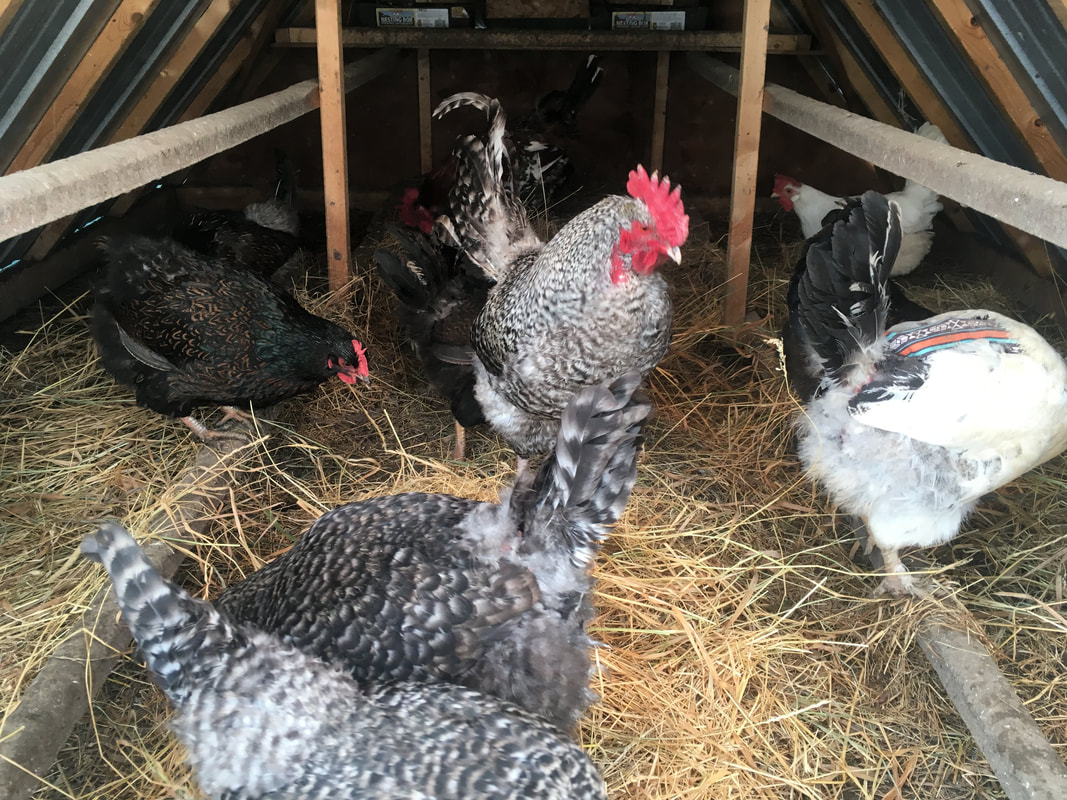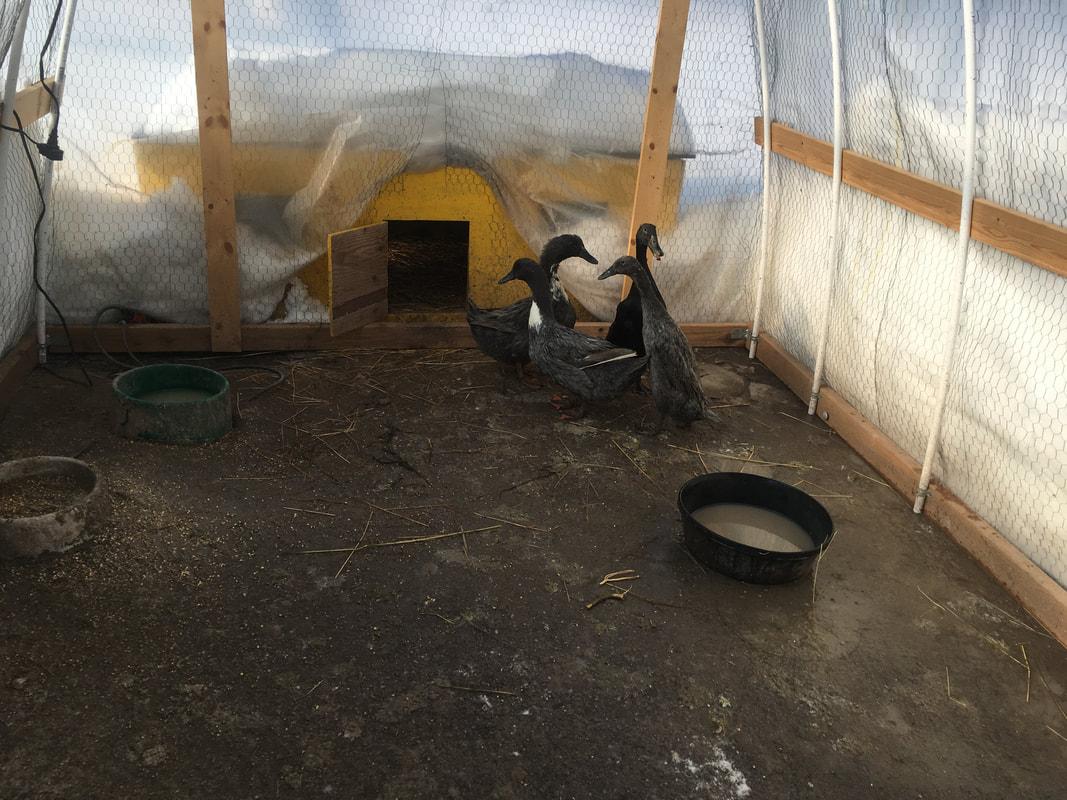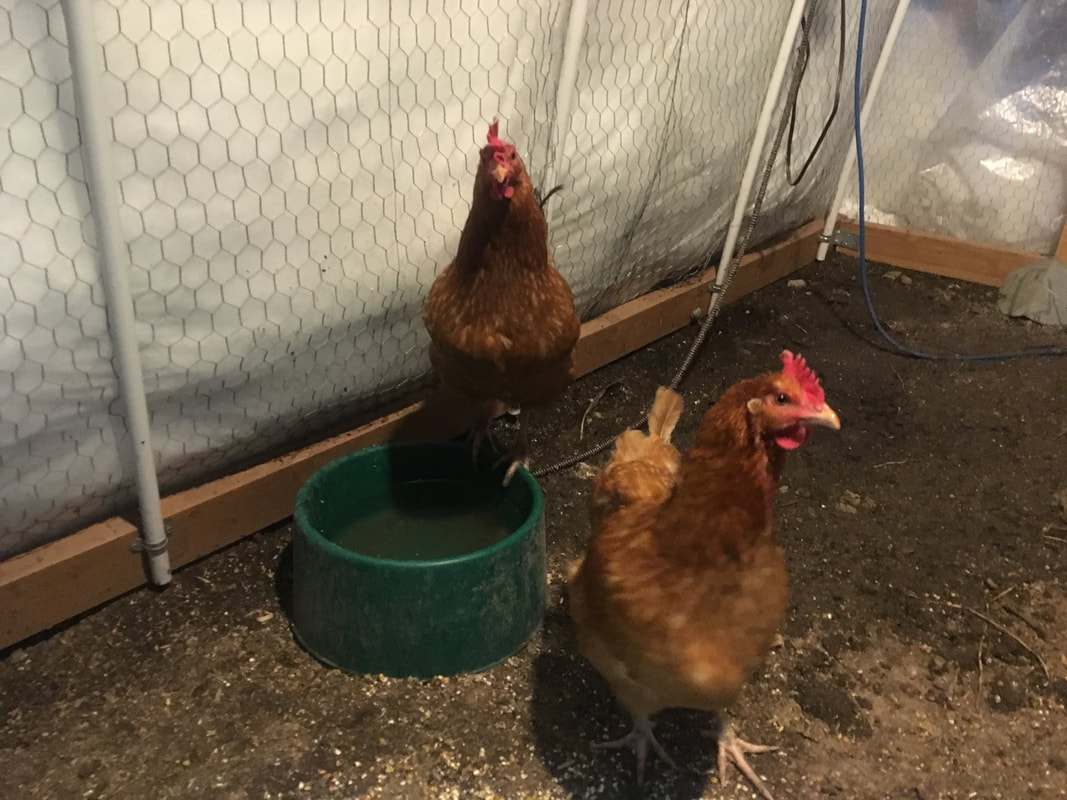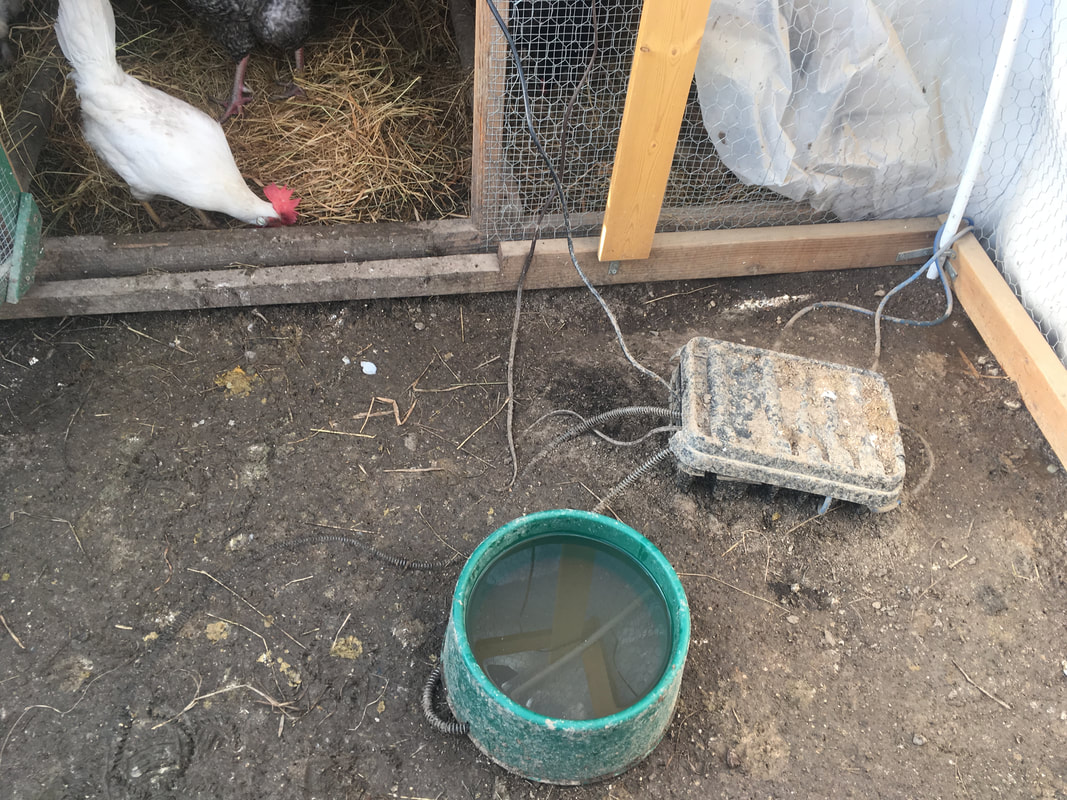|
Keeping chickens and other poultry in winter isn’t difficult but it does require some preparation as repairing or setting up fences in 3ft deep snow or scrambling with extension cords and heat lamps to prevent frost bite in sub zero conditions isn’t easy. Each of the next 6 weeks, I’ll focus on one aspect of caring for chickens and ducks in winter. The main things to prepare for are:
How to Keep Water (& Food) from FreezingYou need a heated waterer and a power source. That is the basic, pretty obvious idea, but there are lots of choices. If you already keep chickens during the warmer months you probably also have your preferred type of waterer. A lot of people use a galvanized metal double walled fount. This was what I used but I switched to a plastic waterer since I started adding apple cider vinegar to their water.
The two basic options for heated waterers is to use a separate heated base to heat a normal waterer or to have a waterer with an integrated heater. In my shopping around, most heated bases cost the same as most integrated heated waterers, so I like to go with an integrated one since its one less piece of equipment. In general, I use the integrated heated waterers year-round (just unplugged in summer) and have a few normal waterers to add so everyone stays hydrated when the temps rise. The main difference between any waterer is how easily can the little shitters get the water dirty. I find this happens even quicker in winter when I have a sometimes daily freeze/thaw cycle and can’t rotate their space because of snow pack, thus everything is mud and all that mud is half poop. If you want them to never be able to get their water dirty, use a nipple waterer. They have to peck at a little metal nipple to get a drop or two of water at a time. Honestly, I hate these. I have a heated one in with my bachelor pad of only roosters but never use it with my laying hens (eggs are mostly water and laying hens need to drink a lot even in winter). For me it takes too long for them to drink a decent quantity and because it only has a few points to get water from they like to fight over it. Chickens will fight over everything. They are the most merciless creatures. Get used to it. Accept it. Learn to work with it. They have a hierarchy and enforce it at all times.
Thus, I like the more open, trough-style waterers. Only so many can drink at a time, but one more can always sneak its head under, over, or around the others. They get them dirty daily, but can be cleaned easily with a sponge. Most of these are the fount-style that have a top and a bottom that work together to let only enough water out to fill the trough at any time. They do need to be kept level and upright or they will empty completely within minutes. There are different designs and some suck and some are fine, but I’ve only ever found which is which by trying them out. Look for ones where the top and bottom separate easily (consider that you may be wearing winter gloves while trying to do this), that don’t have lots of tiny nooks and crannies (it will be annoying to clean), that can be carried easily while full of water (no hoses in winter so you gotta either bring that waterer to the water or the water to that waterer by hand without sloshing or spilling). These are the kind I use in summer and with baby chicks. Which do I use with my laying hens & ducks? None of the above. I use heated dog water bowls. The big farm kind. Do they get them dirty? Yep, pretty much immediately. But they wipe clean easily with a sponge and every few weeks I bring them inside for a soapy, super clean out. I have to empty and clean them more often and thus use more water, but every fount-style one has grown algae inside before they have finished the water (even in winter). They don’t tip over, even if the hens stand on the edge. It is super deep so all that bedding or dirt they kick in sinks wayyyyy to the bottom and stays out of their way until I clean/refill the next day. Plus, they are super important for the ducks. They can stick their heads all the way in (which is a must) and can even jump in for a full splash around (which is a BIG perk in winter and keeps my from trying to heat a whole kiddy pool or stock tank). Tip: If you wanna give the ducks a fun, full-size bath use the rubber tubs. I don’t bother heating them as it’s just for a fun pool party during the day. They won’t break when frozen and since you can bend them, the ice breaks away easily. I just take them outside the run and drop them on the ground upside down until the ice block comes out. Just do it in a place you don’t mind having gallon bricks of ice in the way until spring (like not the walkway, oops). I first ‘discovered’ them as a way to keep their moist, fermented whole-grain feed unfrozen and then started using them as waterers (even in summer, since the cords coil up outta the way inside the walls). I liked them so much that I only use them for water now and use the shallower (more residential size) heated bowls for the feed. They are also either the same price as similar sized ‘chicken’ waterers or cheaper. Almost every winter I end up breaking one as the plastic will crack in sub zero temps if you are too impatient with it or they will get ‘submerged’ by a fast snow melt or by ducks splashing out all the water (if possible, keep it on a ~½’ thick riser, like a scrap of plywood, if it is getting to wet outside as they are not fully sealed from the underside and sitting in too much water will destroy the heater), so the cost of replacing one doesn’t give me a headache. I fill them in the field, using repurposed 1 gallon milk or water jugs to cart out as much water as I need when bringing out the feed in the morning. I call it the tea trolley as I go from coop to coop dropping off feeders and refilling waterers, turning on lights, and letting the chickens into their run. After you have your heated waterer, you gotta plug it in. Most only come with a 2-4ft cord attached so get ready to play with extension cords. If your winter stays well below freezing and/or you gotta run that cord across a lot of ground, get the blue, winter-rated cords that don’t get super stiff. They cost more but the plastic won’t crack when bent, are usually grounded (3 prong), and are high enough amps to handle the heaters. The dog water bowl manufacturers suggest to not use with extension cords. The main concern is the heater not getting enough juice to keep the water unfrozen, but I got them on multiple 50ft + cords running at least 4 heated waterers, 4+ LED bulbs, and (as needed) 2 250W heat lamps. I only ever notice a problem in sub-zero temps (~ -15F) and if the water level is low. Keep the bowls out of the wind, full, and use the higher amp extension cords and you should be golden. I keep the connections (cord to cord, or cords in a power strip) either outside of the animal area in a covered space or keep it in a waterproof connector box. I’m not worried about the chickens electrocuting themselves (maybe a little bit) as much as once they get their dirt and poop in the female ends of the cords or power strips, it will be hell to get it out and a little baby saver cover won’t cut it, it will just become a new thing to rip off and peck at. Tip: keep an extra laying around. They will always break when its the coldest. You will always drop it during the worst blizzard of the season. Unless you wanna bring out fresh water every hour or two, keep an extra. Even though some waterers are easier or more convenient to use, none eradicate basic farm labor and animals need proper care and management to stay healthy and thrive. No matter which style waterer you use, just keep those chickies and quackers hydrated so they can keep dropping those golden-yolk yummies. Next week, I’ll describe how I keep the winter weather from ruffling their feathers and freezing their toes! -Farmer Megan: chicken herder, cat wrangler, duck whisperer, dog walker, vegetable plucker, and flower buncher.
1 Comment
Bonnie
2/11/2019 01:26:31 pm
Great advice AND fun to read! =)
Reply
Leave a Reply. |
AuthorI'm Farmer Megan with a life full of cackles, clucks, quacks, weeds, crazy kitten, and one tiny, senior, blind dog. Archives
May 2024
Categories
All
|




 RSS Feed
RSS Feed